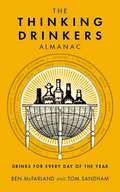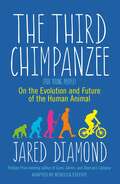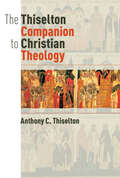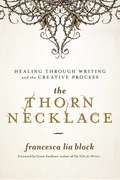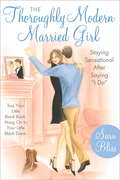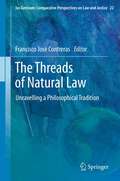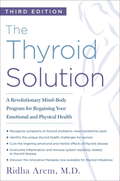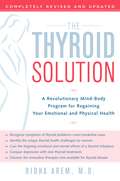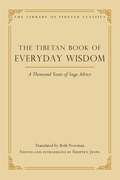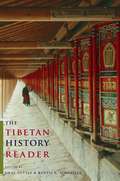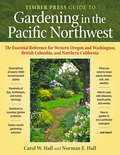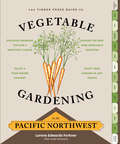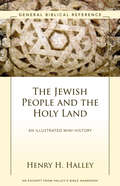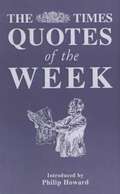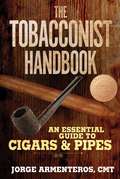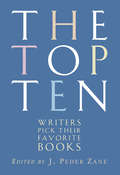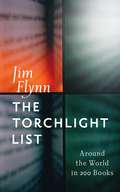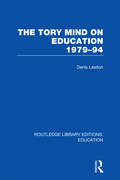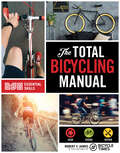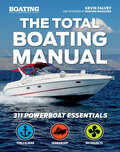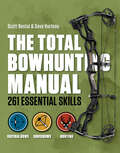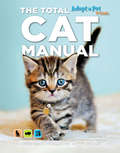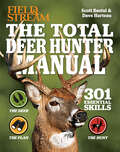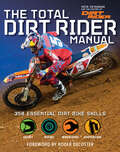- Table View
- List View
The Thinking Drinkers Almanac
by Tom Sandham Ben McFarlandNo matter what day of the year it is and regardless of the occasion, there is always a very good reason to enjoy a drink. Responsibly of course.Aimed at discerning drinkers keen to broaden their booze horizons and those looking to become more adventurous in their elbow-bending, this enlightening and alternative almanac celebrates every day of the year with an appropriate alcoholic drink - featuring everything from Absinthe and Zinfandel to Martinis and Monastic beers.It's a cocktail of cultural history, eccentric events, unlikely anniversaries, recipes and recommendations infused with all manner of 'interestingness', several dashes of drinking did you knows, fascinating facts, famous folk, unsung heroes, lesser-known legendsfrom all walks of life and major weird, wonderful and well-known moments from our past.
The Third Chimpanzee: For Young People (P. S. Series)
by Rebecca Stefoff Jared DiamondThe Third Chimpanzee was first published in 1991 and has been in print ever since. This new, illustrated edition is aimed at a young readership. In it, Jared Diamond explores what makes us human and poses fascinating questions including: If we share more than 98% of our DNA with chimpanzees, how is it that we can write, read, talk, build telescopes and bombs, while we put our speechless and bomb-less close relatives in cages and zoos? What can woodpeckers teach us about spacecraft? Is genocide a human invention? Why does extinction matter? Why are we destroying the natural resources on which we depend for survival? What hope is there for future generations? The Third Chimpanzee for Young Readers is not only a mind-boggling survey of how we came to be who we are, but a plea to the next generation to "make better decisions than their parents and get us out of the mess we're in."
The Thiselton Companion to Christian Theology
by Anthony C. ThiseltonCovering everything from “Abba” to “Zwingli,” The Thiselton Companion to Christian Theology offers a comprehensive account of a wide sweep of topics and thinkers in Christian theology. Written entirely by eminent scholar Anthony Thiselton, the book features a coherence lacking in most multiauthored volumes.Drawing on his encyclopedic knowledge, gained from fifty-plus years of study and teaching, Thiselton provides some six hundred articles on various aspects of theology throughout the centuries. The entries comprise both short descriptive surveys and longer essays of original assessment on central theological topics -- such as atonement, Christology, God, and Holy Spirit -- and on such theologians as Aquinas, Augustine, Barth, Calvin, Küng, Luther, Moltmann, and Pannenberg. The book also includes a helpful time chart dating all of the theologians discussed and highlighting key events in Christian history; select reading suggestions conclude each of the longer entries.Equally valuable for research and teaching, The Thiselton Companion to Christian Theology will be a go-to reference for pastors, students, teachers, and theologians everywhere.
The Thorn Necklace: Healing Through Writing and the Creative Process
by Francesca Lia Block Grant FaulknerFor devotees of Bird by Bird and The Artist's Way, a memoir-driven guide to healing through the craft of writingFrancesca Lia Block is the bestselling author of more than twenty-five books, including the award-winning Weetzie Bat series. Her writing has been called "transcendent" by The New York Times, and her books have been included in "best of" lists compiled by Time magazine and NPR. In this long-anticipated guide to the craft of writing, Block offers an intimate glimpse of an artist at work and a detailed guide to help readers channel their own experiences and creative energy. Sharing visceral insights and powerful exercises, she gently guides us down the write-to-heal path, revealing at each turn the intrinsic value of channeling our experiences onto the page. Named for the painting by Frida Kahlo, who famously transformed her own personal suffering into art, The Thorn Necklace offers lessons on life, love, and the creative process.
The Thoroughly Modern Married Girl
by Sara BlissYou were a fabulous single girl--you were swell, you were a bombshell, you were a bad girl on the open road. Now you’re getting hitched--are your glam days gone for good? Is “matronly” the hidden meaning of matrimony? No way. The Thoroughly Modern Married Girlshows how to retire that little black book without tossing the little black dress. Full of wisdom gleaned from dozens of savvy Married Girls,The Thoroughly Modern Married Girlserves up the pros and cons of changing your name, the trick to hanging out with singletons without feeling wistful, the art of the grown-up (but not geriatric) cocktail party, and the key to staying wildly in love. Plus you’ll get answers to all those sticky questions you might be pondering as you’re about to take the plunge. “Do I have to say good-bye to my exes?” (Yes. It’s impossible to make two men who have both seen you naked into good friends. ) “Can I just marry my guy and divorce his family?” (Sorry, honey, it’s a package deal. ) “How do I deal with the frightening furniture mysans-style guy delivers to our love nest?” (Slip the movers a c-note to “lose” it. ) From the moment you return from the honeymoon and find that the spotlight, tragically, has moved on from you and your guy,The Thoroughly Modern Married Girlhelps you navigate the new terrain of marriage with flair. From the Trade Paperback edition.
The Threads of Natural Law
by Francisco José ContrerasThe notion of "natural law" has repeatedly furnished human beings with a shared grammar in times of moral and cultural crisis. Stoic natural law, for example, emerged precisely when the Ancient World lost the Greek polis, which had been the point of reference for Plato's and Aristotle's political philosophy. In key moments such as this, natural law has enabled moral and legal dialogue between peoples and traditions holding apparently clashing world-views. This volume revisits some of these key moments in intellectual and social history, partly with an eye to extracting valuable lessons for ideological conflicts in the present and perhaps near future. The contributions to this volume discuss both historical and contemporary schools of natural law. Topics on historical schools of natural law include: how Aristotelian theory of rules paved the way for the birth of the idea of "natural law"; the idea's first mature account in Cicero's work; the tension between two rival meanings of "man's rational nature" in Aquinas' natural law theory; and the scope of Kant's allusions to "natural law". Topics on contemporary natural law schools include: John Finnis's and Germain Grisez's "new natural law theory"; natural law theories in a "broader" sense, such as Adolf Reinach's legal phenomenology; Ortega y Gasset's and Scheler's "ethical perspectivism"; the natural law response to Kelsen's conflation of democracy and moral relativism; natural law's role in 20th century international law doctrine; Ronald Dworkin's understanding of law as "a branch of political morality"; and Alasdair Macintyre's "virtue"-based approach to natural law.
The Thyroid Solution (Third Edition): A Revolutionary Mind-Body Program for Regaining Your Emotional and Physical Health
by Ridha AremAn updated and expanded edition of a trusted resource, which explains how to use diet, exercise, stress control, and hormone treatments to maintain thyroid health The Thyroid Solution is a must-read for anyone who suffers from thyroid disease. Written by a medical pioneer and leading authority in the field of thyroid research, this groundbreaking book offers Dr. Ridha Arem’s practical program for maintaining thyroid health through diet, exercise, and stress control—and through his revolutionary medical plan, which combines two types of hormone treatments and produces astounding results. This revised edition includes information on • the discovered links between thyroid issues and fatigue • a unique treatment program to overcome the physical and mental effects of thyroid disease • the best ways to combat Hashimoto’s thyroiditis and Graves’ disease • optimal treatment of thyroid imbalance before, during, and after pregnancy • strategies to minimize cardiovascular risks related to thyroid disease • how thyroid hormone affects weight, metabolism, and eating behavior Featuring a thyroid- and immune-system-friendly diet for healthy and successful weight loss, inspiring patient histories, and interviews that document the dramatic success of Dr. Arem’s bold new treatments, The Thyroid Solution remains the essential resource for doctors and patients on maintaining thyroid and immune-system wellness.Praise for The Thyroid Solution“Dr. Arem uncovers the root causes of thyroid disease and lays out an innovative program to help you overcome thyroid dysfunction.”—Amy Myers, M.D.“Clear, comprehensive, and incredibly useful . . . the best thyroid resource I have ever read.”—Kathleen DesMaisons, Ph.D., author of Your Last Diet!“Quite simply the best thyroid book on the market today . . . Dr. Arem validates what I have found in my practice for more than twenty years, especially the importance of T3. I highly recommend this book.”—Elizabeth Lee Vliet, M.D., author of Screaming to Be Heard: Hormone Connections Women Suspect . . . and Doctors Still Ignore
The Thyroid Solution: A Revolutionary Mind-Body Program for Regaining Your Emotional and Physical Heal th
by Ridha AremIt's sometimes called a hidden epidemic: One in ten Americans--more than twenty million people, most of them women--has a thyroid disorder. At any given time, millions of people have an undiagnosed thyroid disorder and experience a chronic mental anguish that almost certainly arises from the very same source. Yet many primary-care doctors still don't recognize the importance of the thyroid in mind-body health--and its especially crucial role in women's well-being.The Thyroid Solution is a must-read for anyone who suffers from a thyroid condition. It's the first mind-body approach to identifying and curing thyroid imbalances. Written by a medical pioneer and leading authority in the field of thyroid research, this groundbreaking book offers Dr. Ridha Arem's practical program for maintaining thyroid health through diet, exercise, and stress control--and through his revolutionary medical plan, which combines two types of hormone treatments with astounding results. Inside you'll discover- The thyroid basics--what it is, where it is, what it does- How thyroid hormones affect the brain and alter mood, emotions, and behaviorleading to brain fog, weight gain, loss of libido, infertility, anxiety, and depression- What tests to ask your doctor to give you--and what they mean- The vital connection between stress and thyroid imbalance- The benefits of antioxidants and essential fatty-acid foods and supplements- How to recognize and cure the deep and lingering effects of a thyroid imbalanceFilled with remarkable patient histories and interviews that document the dramatic results of Dr. Arem's bold new treatments, The Thyroid Solution now gives you and your doctor the tools you need to live a life with peace of mind . . . and body.
The Tibetan Book of Everyday Wisdom (Library of Tibetan Classics #1)
by Beth Newman Jinpa ThuptenEnjoy popular Tibetan collections of advice, fables, and aphorisms for following the way of the wise and avoiding the paths of fools.The Tibetan Book of Everdyay Wisdom: A Thousand Years of Sage Advice presents a genre of Tibetan works known as “wise sayings” (lekshé). While most Tibetan literature focuses on the Buddhist path, “wise sayings” literature has traditionally been a centerpiece of secular education in Tibet and in the cultivation of social mores and an honorable way of life. Drawing inspiration from classical Indian literature on human virtue and governance (nitisastra), including the folktales in the Pañcatantra, the authors of these Tibetan works strove to educate young minds in the ways of the civilized world, especially by distinguishing the conduct of the wise from that of the foolish. This anthology includes some of the best-loved classics of Tibetan literature, such as Sakya Pandita’s Jewel Treasury of Wise Sayings, Panchen Sönam Drakpa’s Ganden Wise Sayings, and Gungthang’s Treatise on Trees and Treatise on Water. The final work is the intriguing Kaché Phalu’s Advice. Ostensibly written by a wise Tibetan Muslim, this versified text enjoys great popularity within Tibetan-speaking communities, such that most people are able to recite at least a few verses from memory.
The Tibetan History Reader
by Gray Tuttle Kurtis SchaefferCovering the social, cultural, and political development of Tibet from the seventh century to the modern period, this resource reproduces essential, hard-to-find essays from the past fifty years of Tibetan studies, along with several new contributions. Beginning with Tibet's emergence as a regional power and concluding with its profound contemporary transformations, the collection is both a general and specific history, connecting the actions of individuals, communities, and institutions to broader historical trends shaping Asia and the world. With contributions from American, French, German, Italian, Chinese, Japanese, and Tibetan scholars, the anthology reflects the international character of Tibetan studies and its multiple, interdisciplinary perspectives. By far the most concise scholarly anthology on Tibetan civilization in any Western language, this reader draws a clear portrait of Tibet's history, its relation to its neighbors, and its role in world affairs.
The Timber Press Guide to Gardening in the Pacific Northwest: The Essential Reference For Western Oregon And Washington, British Columbia, And Northern California
by Carol W. Hall Norman E. HallTired of being lumped into the unwieldy category of a western garden? Frustrated by the lack of reliable, practical information about gardening in the Pacific Northwest? No longer! The Timber Press Guide to Gardening in the Pacific Northwest presents all the information a gardener—whether novice or expert—needs to keep their garden beautiful and thriving. With a combined 100 years of gardening experience in the Pacific Northwest, the authors clearly explain the unique challenges and joys of gardening in the region. By dividing the Pacific Northwest into seven subregions, they help readers to better understand the climatic and geographical factors that shape their gardens. This complete guide includes extensive profiles of plants that are ideally suited to the region, including perennials, ornamental grasses, bulbs, groundcovers, roses, shrubs, trees, and climbers. The month-by-month gardening calendar describes what weather patterns to expect, what's in bloom, and what garden tasks are best done in that month. With additional chapters detailing the most common gardening problems and recommendations for effective, nontoxic ways of dealing with them, this book is nothing short of essential.
The Timber Press Guide to Vegetable Gardening in the Pacific Northwest: A Timber Press Guide (Regional Vegetable Gardening Series)
by Lorene Edwards ForknerThere is nothing more regionally specific than vegetable gardening. What to plant, when to plant it, and when to harvest are unique decisions based on climate, weather, and first and last frost.The Timber Press Guide to Vegetable Gardening: Pacific Northwest is a growing guide that truly understands the unique eccentricities of the Northwest growing calendar, covering Oregon, Washington, southeastern Alaska, and British Columbia. The month-by-month format makes it perfect for beginners and accessible to everyone—you can start gardening the month you pick it up. Starting in January? The guide will show you how to make a seed order, plan crop rotations and succession plantings, and plant a crop of microgreens. No time to start until July? You can start planting beets, carrots, chard, kale, parsnips, and spinach for an early fall harvest.
The Time Between the Old and New Testament: A Zondervan Digital Short
by Henry H. HalleyDerived from Halley’s Bible Handbook, a world-renowned, accessible guide to the Bible now in its 25th edition, this digital short sketches the history of the time between the Old and New Testaments. The rise of the Greek and then Roman Empires, the Maccabees, Herod’s Temple, the Sanhedrin—this introduction to a fascinating era not covered in the Bible includes all of the above and more. Useful for Bible students wanting to better understand the cultural context of the New Testament and for readers interested in Middle Eastern and early European history, The Time Between the Old and New Testaments shines light on a key period in world and religious history.
The Times Quotes of the Week
by Philip HowardThe "Quotes of the Week" column in "The Times" selects comments, from the humorous and scabrous, to the learned and profound, made during the week. This selection distills down the wit and wisdom of the column. Introduced by regular Times columnist Philip Howard, this selection includes such gems as Alan Clark on having skeletons in the cupboard, the Queen on her mother to Nelson Mandela, and such not-to-be-forgotten gems as an anonymous BBC security guard's address to King Constantine: "who did you say you was king of, mate?"
The Tiny Kitchen Cookbook: Strategies and Recipes for Creating Amazing Meals in Small Spaces
by Annie MahleWhether home is a small apartment, a tiny house or RV, a boat, or a college dorm room, space in the kitchen is nearly always at a premium. But cooking in a small kitchen, with minimal equipment, doesn't have to be limiting; it can actually be is a great opportunity to hone food-prep skills and become a more efficient, versatile home chef. And the smarter the workspace, the easier it is to cook. In The Tiny Kitchen Cookbook, chef Annie Mahle shares her small-space cooking strategies and 50 of her favorite recipes she developed as the galley chef aboard the J&E Riggin, a windjammer she operated with her husband off the coast of Maine for many summers. From her 6-by-8-foot kitchen, she prepared three beautiful, flavorful meals from scratch every day, for up to 30 people. From versatile breakfast options, such as Sweet Corn and Jalapeno Pancakes or Pan Roasted Honey Pears with Oatmeal, to one-bowl salads and mains, stovetop meals such as Pan-Fried Red Snapper with Fresh Peas, Shiitakes, and Asparagus with Dill, dishes that can be prepared in the toaster oven (for cooks without a full oven) such as Cheese-Stuffed Meatballs with Fresh Tomato Sauce and Fettuccini, and even make-ahead desserts in a mug, every recipe is delicious and utterly attainable in a kitchen with as little as six square feet of counter space. Along with gorgeous recipes, Mahle delivers tips and techniques for making the most of a small kitchen. Strategies such as &“shopping&” the pantry before going to the store, transforming leftovers into new meals, create vertical storage options, and buy utensils that nest all help create meals with maximum flavor in minimal space. This publication conforms to the EPUB Accessibility specification at WCAG 2.0 Level AA.
The Tobacconist Handbook: An Essential Guide to Cigars & Pipes
by Jorge ArmenterosLearn the ins and outs of tobacco use, from cigars, pipes, vapes, hookahs, and more! As we live in the &“golden age of cigar making,&” there is more to know and appreciate than ever before. Great cigars and pipe tobaccos take years to grow, nurture, age, blend, and construct, yet their destiny is to return to dust; it is an extraordinary transformational and artistic journey that yields priceless moments and memories for the aficionado. But where do things begin? Where to start? From Jorge Armenteros, founder of Tobacconist University®, you will learn everything you want and need to know about cigars and pipes. From seed to cigar, Armenteros will teach not only the history of tobacco, but what the future holds. The Tobacconist Handbook exists as a resource for lovers of luxury tobacco to enhance our knowledge, appreciation, and quality of life. Included in this handbook are numerous important lessons, including:Learning the different types of tobaccoWhich cigar best suitsMaking the perfect cutSetting up a humidorAnd much more Great cigars and pipes help us ruminate, decompress, gather our thoughts and emotions, revitalize ourselves, and savor our time. Furthermore, through education you will learn that luxury tobacco products are used by choice and not out of habit. They are products created by great craftsmen and women who honor thousands of years of traditions and history. Whether you&’re a seasoned smoker or someone looking to learn more about the history and becoming a cigar aficionado, The Tobacconist Handbook is the perfect place to start.
The Top Ten: Writers Pick Their Favorite Books
by J. Peder ZaneWhat if you asked 125 top writers to pick their favorite books? Which titles would come out on top? You'll find the answer in The Top Ten: Writers Pick Their Favorite Books: the ultimate guide to the world's greatest books. As writers such as Norman Mailer, Annie Proulx, Stephen King, Jonathan Franzen, Claire Messud, Margaret Drabble, Michael Chabon and Peter Carey name the ten books that have meant the most to them, you'll be reminded of books you have always loved and introduced to works awaiting your discovery. The Top Ten includes summaries of 544 books--each of which is considered to be among the ten greatest books ever written by at least one leading writer. In addition to each writer's Top Ten List, the book features Top Ten Lists tabulated from their picks, including: * The Top Ten Books of All Time * The Top Ten Books by Living Writers * The Top Ten Books of the Twentieth Century * The Top Ten Mysteries * The Top Ten Comedies Already sparking debate, The Top Ten will help readers answer the most pressing question of all: What should I read next?
The Torchlight List: Around the World in 200 Books
by Jim FlynnIn today's world it seems that everywhere we turn we are saturated with book recommendations from talk shows, magazines, radio shows, friends, and top ten lists. <P><P>But which books are really the best, and what effects do the books we read have on our intelligence? The Torchlight List has the answers. A professor for over forty years, Jim Flynn was concerned when he saw that his students were reading less and less. He decided to compile a list of recommendations for them, which expanded to include two hundred titles that transport the reader into a magic realm of knowledge and imagination. The books must also shed light on human psychology, history, science, or philosophy: the concepts needed to comprehend the complexities of the modern world.The list, named in honor of Flynn's uncle who read by torchlight onboard a ship during WWI, is divided by geographical area. Flynn offers a brief explanation on the history each book deals with and comments on the plots with humor and wit. He bets each reader that at least one of the five first titles will change his or her life. This is a book that will inspire you to reread books you love, and to discover and relish many new ones.
The Tory Mind on Education: 1979-1994 (Routledge Library Editions: Education)
by D LawtonThis book discusses conservative education policies since 1979 by referring to beliefs, values and attitudes. It relates ideology to policies and provides some background about the years before 1979 – definitions of Conservatism and descriptions of Tory beliefs and traditional Conservative views on education. The second part of the book provides a brief outline of the years between the 1944 Education Act and 1979.
The Total Bicycling Manual: 268 Essential Skills
by Robert F. James The Editors of Bicycle TimesA guide to everything you need to know to enjoy the sport of cycling, from finding the right bike to learning how to do your own repairs and maintenance.You never forget how to ride a bike . . . but do you know how to get a great deal on a used bike (and avoid getting ripped off!), set up your commuter bike for optimal safety (without sacrificing fun), plan the perfect family ride for kids of all ages, and train for your first endurance ride? Bicycle Times magazine reaches hundreds of thousands of “everyday cyclists” —riders who care more about having a great ride than spending a year’s salary on a tricked-out racing bike. Their mission is to make cycling fun and accessible for everyone . . . families, commuters, travelers, and weekend warriors included.This book is the one practical manual every cyclist should have—right next to the toolbox or stashed in a pannier. A quick but comprehensive intro chapter on finding the right bike for every need (and why so many cyclists are sure they need one of each!), which includes detailed information on what to look for in a new or used bike, when to pay a little more for components, and where you can economize creatively.Filled with practical, wheels-on-the-ground tips, this book will make you a better rider, take you places you never thought you’d go, and make sure you never get stranded by the roadside without the tools or know-how to fix your ride.
The Total Boating Manual: 311 Powerboat Essentials (Boating Magazine)
by Kevin Falvey The Editors of Boating MagazineThe comprehensive powerboating guide from the experts at Boating magazine, with essential info on the latest boats and gear—plus expert tips and more. Boating magazine is the destination for powerboat information, whether your goal is competitive deep sea fishing or soaking up rays on the lake. The Total Boating Manual draws on the knowledge and expertise of our writing staff to provide unbiased and well-researched reviews and tips on boating gear, open-water techniques, repair and maintenance, and more. Find the perfect boat New or used, speedboat to bass rig, you&’ll learn how to find the perfect boat for you and get the most bang for your buck. You&’ll also find insider tips on buying a used boat, how to tell if a fixer-upper is worth it, and upgrading your existing boat to the craft of your dreams. Get the gear From essential electronics to basic aftermarket equipment, to trailers and accessories, we&’ve got you covered. Do you really need a fish-finder? How do tow chains work? What&’s the best GPS for open water? It&’s all here. Water Safety From everyday excursions to deep-sea sport fishing, safety is essential. Find all the safety tips and techniques you need to face any emergency on the water. Insider Hints Learn the best practices in piloting a boat, essentials of seamanship, all the knots you&’ll ever need, how to back up a trailer in a dangerously tight spot, and much more. DIY Tricks From DIY repairs to time (and money) saving tips - get all the insider info straight from the experts.
The Total Bowhunting Manual: 261 Essential Skills
by Scott Bestul Dave HurteauFrom Field & Stream&’s bowhunting experts and the authors of The Total Deer Hunter Manual comes the book that demystifies everything about bowhunting. From crossbows to high-tech compound bows to an old-fashioned recurve find it all, accompanied by tactics for every animal that can be bowhunted, in The Total Bowhunting Manual. With high-quality design and intricate detail, this manual is perfect for your tablet or phone. America&’s best hunting guides bring you 261 field-tested tips, tricks and skills from decades of experience:· Shoot Better: With detailed exercises and advice for every kind of bow, this book takes you out on the archery range, into the woods, and onto the water with specialized drills and exercises.· Get the Gear: Bowhunting is a gear-heavy sport, and improvements are being made almost every day, but you need to find the right type, size and fit. Whether you want to hunt like Robin Hood or Katniss with historic gear or take to the trees with a high-tech, carbon fiber compound bow with all the accessories, these authors detail what you need.· Bring Home a Trophy: When people think &“bowhunting&” they think of deer but any animal that you can hunt, can be hunted with a bow. Find tips for taking down alligators, moose, birds, bears, caribou, turkey, fish and more; all the expert advice you need to go home with a trophy, not an excuse. Whether you&’re preparing for trip of a lifetime or just want to extend your season and improve your technique, this is the book you need.
The Total Cat Manual: Meet, Love, and Care for Your New Best Friend (Adopt a Pet)
by David Meyer Abbie Moore Dr. Pia SalkMore than 200 tips on choosing and caring for your new feline friend, from North America&’s largest non-profit pet adoption website. Includes photos! From adoption and care to behavior and communication, this comprehensive guide to cats comes from the experts at Adopt-a-Pet.com, who have spent many years connecting homeless pets to their new families. It covers: Basics: Understand your new kitten or cat, prepare for a new arrival, get the skinny on supplies and toys, and learn everything you need to know to integrate a kitty into your home and life. Behavior: Get the scoop on breed characteristics, troubleshoot problems, and learn how to communicate with your new friend. Care & Health: Choose a veterinarian, treat common ailments, and keep kitty clean, happy, and safe! With useful tips, wonderful photos, and information that&’s helpful no matter the breed or age of your cat, The Total Cat Manual gives you the whole kitten caboodle!
The Total Deer Hunter Manual: 301 Essential Skills (Field & Stream)
by Scott Bestul Dave HurteauTake your whitetail obsession to the next level with this go-to guide from two of the most knowledgeable and experienced deer-hunting writers in America.Whether you spend all year plotting and preparing for your ultimate whitetail season, or just enjoy a few hunting trips a year with your buddies, this is the book you need. Hundreds of field-tested tips from Field & Stream’s deer-hunting experts cover tips and tricks from America’s best hunting guides and their own decades of experience, including: Shoot Better: With detailed exercises and advice for bow-hunters as well as rifle and shotgun users, this book takes you out on the range and into the woods, with what you need to bring home a trophy buck instead of a lame excuse. Plan All Year: What do you do when deer season ends? Stow your gear, mount your trophies, and start planning for next year. Here’s how to plot your hunting grounds, plant the food deer love, and upgrade your equipment. Track Like a Pro: Where do deer live? What do they eat? How do they behave during the all-important rut season? You may think you know the answers to these questions, but the latest research and unusual historical wisdom will surprise you—and make you a better hunter.
The Total Dirt Rider Manual: 358 Essential Dirt Bike Skills
by Pete Peterson The Editors of Dirt RiderThis essential guide from the experts at Dirt Rider magazine covers everything from riding and repair basics to motocross tricks and flips. Affordable and easy to ride, dirt bikes are a great way to enjoy the great outdoors and build riding skills. Whether you just want to enjoy a ride through the backcountry or you&’re gunning for motocross stardom, this book is full of hand-on tips and tricks to get you there. The Total Dirt Rider Manual covers: Gear: Learn how to buy the right bike for you, whether you&’re looking at new models or used rides; suit up for style safety, and comfort; and adapt your gear to a wide range of riding conditions. Riding: Get all the information you need to enjoy a casual day on the trails or to compete year-round. Wrenching: The best of Dirt Rider magazine&’s &“Dr. Dirt&” feature, providing step-by-step tutorials for repairs of all kinds. Suspension: A bike&’s suspension is vital, expensive to fix, and tricky to diagnose. This special section offers clear, practical tips from America&’s top race-bike mechanics that could save you thousands of dollars.
